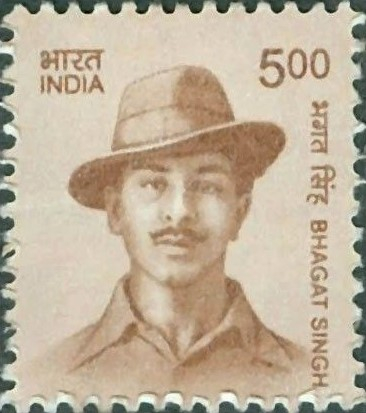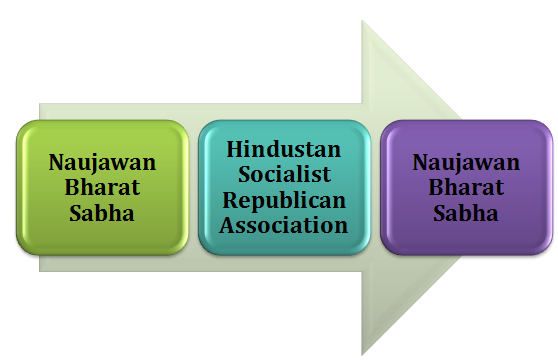

Bhagat Singh played an important role in the revolution in the struggle for freedom in India during the early period of the 20th century. At this particular stage, the rulers of the British got complete control of the several provinces of this country. He was a political renegade and considered the most significant progressive-minded leader of India. He became the leader of the Hindustan Republican Association and he became more enthusiastic as well as enthusiastic about the exercises of revolution.
The eminent personalities of Indian politics were born in the province of Bangal located in the district of Lyallpur in Punjab presently located in Pakistan. He was born on 27th September in the year of 1907 (Patyar, 2018). He belonged to a Sikh family.
The family of Bhagat Singh was integrally involved in the struggle for freedom in India. He came to the movement for freedom at a very early stage.
He defied the government of Britain from his childhood and he also burned all the textbooks that were recommended by the government of Britain (Patyar, 2018).
He was a supporter of Mahatma Gandhi from an early age of him and a part of the Non-Cooperation movement led by him.
After the withdrawal of this movement by MK Gandhi in the incident of Chauri Chaura, Bhagat Singh then turned to a type of revolutionary nationalism movement.
He was greatly affected by the massacre of Jallianwala Bagh in 1919 and he also protested against the violence of Akali protestors who were unarmed at Nankana Sahib in the year 1921.
He was also inspired by the leftist writings and he became an atheist against the capitalism of Britishers.
Several revolutionary leaders led the struggle of the Indian national movement but the name Bhagat Singh is always in the primary position among them. His contributions to the field of Indian politics are great. He founded Naujawan Bharat Sabha, a committee of freedom fighters of India in the year 1926 and the aim of this organization was to encourage the young people against the torture of the British.

Bhagat Singh
India Post, Government of India, GODL-India
Singh led the rally of peasants as well as the workers to make protest against the rule of the British. He also set up the Hindustan Socialist Republican Association in 1928 with the help of Chandrashekhar Azad, Sukhdev and other political leaders of India.
After the death of Lala Lajpat Rai in 1928 the struggle of this organization increased highly and they strongly revolt against the rules of the British. He tried to get revenge on the leader’s death.
He assassinated J.P Saunders by mistake but he wanted to kill James Scott who killed Lala Lajpat Rai. This incident is known as the Lahore Conspiracy Case and for the reason he was imprisoned by the British police. After the incident, he fled from the place and changed his appearance so that no one can identify him.
This Bombing is another important case for this case Singh was charged by the British police. He was involved in this incident. Singh along with Batukeshwar Dutt threw bombs in the community hall of Central Assembly in Delhi on April 8, 1929.
Singh threw pamphlets as well as raised slogans of freedom struggle. Both of them were arrested by the police force of the British and were imprisoned. The British grew perturbed that their revolution of them could instigate the other freedom fighter and spread the message of anti-imperialism. He also founded Naujawan Bharat Sabha.

Contributions of Bhagat Singh to Indian politics
Not anybody was harmed on that occasion, as they had no intention to harm anyone. They only wanted to instigate the Indians against the torture of the British to make the deaf hear. Singh was the main mastermind of this incident and planned this incident inspired by Auguste Vaillant who was an anarchist of France. For this incident, he was arrested by the police force of British and imprisoned until his death.
The police force of the British arrested Singh because the Saunders murder case and the Central Assembly Bombing Case were also connected to it. The trial for this incident commenced in 1929. He was greatly tortured by the British police and eminent politician Jawaharlal Nehru came to see him in jail and showed pain for his pathetic situation. He fasted for more than 115 days and his father along with Congress leaders requested him to withdraw his fasting.
The British authority decided to hand the trio Singh along with Rajguru as well as Sukhdev. They were hanged on 24th March 1931 and the officials of the British kept the incident secret. Their death created a great revolution in the mind of all freedom fighters and youngster. A great number of youngsters joined in the struggle for freedom after this incident. March 23 is observed in India as Martyrs’ Day in honour of this trio.
Q.1. Why Singh became a legend in Indian politics?
Ans. The youngsters of that stage were greatly moved and inspired by the movement and the ideology of Bhagat Singh. His process of working was the main reason for fear of the officials of the British force.
Q.2. What were the associations founded by Bhagat Singh?
Ans. Bhagat Singh was the founder of Naujawan Bharat Sabha which was established in 1926. He built another important association in 1928 The Hindustan Socialist Republican Association.
Q.3. What is the reason for the arrest of Singh?
Ans. Singh was arrested by the police force of the British for the Lahore Conspiracy Case. The murder case of J.P Saunders was also connected to this case. He also raised a revolutionary movement in India.